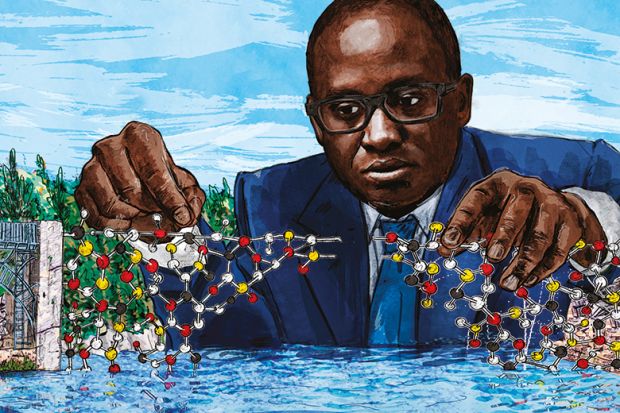When a government reshuffle is imminent, civil servants dust down their briefing books for incoming ministers. These contain important background information on policy, as well as the inevitable “to do” list.
Sam Gyimah, appointed last week as the UK’s latest minister for higher education, will no doubt have been studying his new brief assiduously. Of course, his predecessor has done the legislative heavy lifting, but there is enough on the implementation front to keep Gyimah busy.
Whitehall watchers have already spent time poring over the significance of Jo Johnson’s departure. Had he crossed the prime minister once too often on issues such as Brexit and migration? Was his departure tied to the resignation of his erstwhile boss, Justine Greening? And did the saga over Toby Young’s contentious appointment to the board of the Office for Students seal his fate?
We will never know. But the reasons for ministers being moved around departments are often more prosaic. Simply put, spaces need to be created for the young and thrusting. All-purpose technocrats such as Johnson can be deployed effectively in other places.
Back to Gyimah. By all accounts, he is a very capable minister with prior experience of working in the Department for Education. His most recent brief, prisons, was no picnic, so he will no doubt be robust in his dealings with the sector.
Even if he wanted to shift the broad direction of higher education policy (and why would he?) he has limited room for manoeuvre. However, the fact that he comes to the department along with a new secretary of state, Damian Hinds, does provide headroom for some important change.
First, Gyimah can reset the tone of the relationship with the sector. It had all become too scratchy in the latter days of Johnson. The unnecessary provocation around some of the appointments to the OfS board will be quickly forgotten, but Gyimah has a chance to quickly say something powerful about the constructive relationship that he wants to forge with universities.
A good, first test will be to see how he responds to the consultation on the new regulatory framework to be overseen by the OfS. Coupled with that is an opportunity to move beyond the media and political rhetoric of recent months around freedom of speech and vice-chancellors’ pay.
Opinion polling suggests that the public are not hostile to universities: they recognise the benefits that they bring to individuals, communities and the wider economy. Hopefully Gyimah, like his predecessor, will get out and about to visit universities and understand more about what drives their staff and students.
Second, and with a nod to Johnson’s new responsibilities, the TEF train has left the station and there is no going back. Gyimah would put himself in a strong position, though, if he committed to no further changes to the teaching excellence framework until the independent review of it reports to Parliament. He would buy himself time to think and consult on next steps.
Third, Gyimah should take the opportunity to focus more on the science, research and innovation dimensions to his brief. He has the space to do so because, from 1 April, the OfS will be fully up and running. He can put his weight behind ensuring that the government's target to increase public and private research investment from 1.7 per cent of GDP to 2.4 per cent by 2027 is met, and in a way that provides opportunities for universities through open and transparent allocation of funding. Bringing universities to the heart of the industrial strategy is another potential big win for Gyimah, an erstwhile entrepreneur.
Fourth, Gyimah’s biggest task is probably to oversee the promised review of tertiary education funding. We still know very little about this yet, but Hinds will be all over it too, given the political salience of tuition fees. Based on what Hinds and Gyimah have said and written previously, it is likely that there will be a strong social mobility dimension to it – and, indeed, to all other aspects of higher education policy. Might these new appointments herald the advent of better financial support for those in need?
And then there’s Brexit. Junior ministers might feel like very small cogs in the huge machine devoted to removing the UK from the European Union. But the higher education minister may be the exception, able to punch well beyond his weight.
He can press the case for a flexible and sensible approach to immigration, and work with the sector to promote a welcoming message to potential overseas students and staff. In that task, the new immigration minister, Caroline Nokes, could be an ally, alongside the estimable Robin Walker, who remains at the Department for Exiting the European Union.
Finally, let me repeat a plea made to all new universities ministers. Recognise that the power of UK higher education lies in its diversity of size, mission and location. As Johnson said in a valedictory tweet that employed only a modicum of hyperbole, universities are “our greatest national asset and best thing about this country”.
Sir David Bell is vice-chancellor of the University of Reading and a former permanent secretary of the Department for Education.
Register to continue
Why register?
- Registration is free and only takes a moment
- Once registered, you can read 3 articles a month
- Sign up for our newsletter
Subscribe
Or subscribe for unlimited access to:
- Unlimited access to news, views, insights & reviews
- Digital editions
- Digital access to THE’s university and college rankings analysis
Already registered or a current subscriber? Login






